- Home
- Jim Butcher
Cursors's Fury ca-3 Page 18
Cursors's Fury ca-3 Read online
Page 18
A few moments later, Lord Cereus arrived. Among the Citizenry of the Realm, Cereus Macius was something of a rarity-a silver-haired, elderly man. Either he had lacked the talent for preserving his outward youth, or he had simply never bothered to maintain it. There were rumors that Cereus’s furycrafting abilities were somewhat stunted when it came to watercrafting, though Amara had no way to know if the rumors were based on fact, or if the fact of his appearance had given birth to the rumors.
Cereus was of medium height and slender build, with a long, morose-looking face and blunt, strong fingers. He entered, two hard-faced men flanking him, hands on their swords. Upon seeing Bernard and Giraldi, the two men paused and narrowed their eyes. Bernard and Giraldi returned their scrutiny with matching impassivity.
“I wonder, Countess Amara,” Cereus murmured, his tone whimsical. “Are we to let them sniff one another’s rumps and become friends, or should we tie their leashes to separate walls to avoid trouble.”
“Your Grace.” Amara smiled and rose, bowing deeply. “They mean well.”
Cereus took her hands in both of his, smiling, and nodded back to her. “You may be right. Gentlemen, if there’s fighting to be done tonight, I’d prefer that it not be in my garden. Very well?”
The two bodyguards nodded and withdrew by half a step and no more. Giraldi grinned and went back to his food. Bernard smiled and bowed to Cereus. “Of course, Your Grace.”
“Count Calderon,” Cereus said. “Welcome. Though I fear you have come to my city at a most unfortunate time.”
“I am here, Your Grace,” Bernard said firmly. “And I offer you whatever aid I can provide.”
“Thank you,” Cereus said, no trace of irony in his words. “Countess, are the others coming?”
“Yes, Your Grace,” she said. “But it may take more time. Most of the survivors were badly traumatized by the city’s panic.”
Cereus grunted and lowered himself stiffly onto a richly, beautifully carved wooden bench. “Understandable.” He squinted at Bernard. “Your sister, the…” He blinked as if mildly disbelieving, “… Steadholder. The woman Steadholder. She’s a talented watercrafter, yes?”
“Yes,” Bernard said.
“How is she?”
“Exhausted. Sleeping,” Bernard replied. “She’d had a difficult day even before the stars changed.”
“The panic was extremely painful to those of sensitivity to such things. If there is anything I can do to help her, please send word to me,” Cereus said.
Bernard bowed his head. “Thank you, Your Grace. Your offer of secure quarters was more than generous enough. She’s resting comfortably.”
Cereus squinted at Giraldi. “Is that ale? Real, honest ale?”
Giraldi belched.
“Crows and thunder,” Cereus said. “Do you have another mug, soldier?” Giraldi did. Cereus sipped, let out a long sigh, and settled back down on his bench. “My daughter, you see,” he explained. “She’ll not let an old man have a well-earned draught. Says it isn’t good for my heart.”
“Got to die of something,” Giraldi observed. “Might as well put back a few pints while you wait to see what it is.”
“Exactly,” Cereus said. “The girl’s got a heart of gold, but she doesn’t see that.” He glanced over his shoulder, at the battlements rising above the garden, and the old lord’s face settled into deeper lines, marks of worry and grief etched in the shadows on his face. Amara watched as he settled down to sip carefully at the ale and wait for the others to arrive. It didn’t take long. Within half an hour, High Lord Cereus’s little garden was crowded with visitors. “Well,” he said, looking around with a somewhat lost expression on his face. “I suppose we should begin.”
Cereus rose. He stepped up onto his bench with an apologetic expression and rapped a ring against his now-empty mug. “My lords, ladies. Welcome. Would that it were a happier occasion.” He smiled faintly and gestured. “I have asked you here on behalf of the First Lord and his Cursor, Countess Amara. Countess.”
Lord Cereus stepped down from the bench with a visible expression of relief.
Amara bowed her head to Cereus, took a small coin from her pocket, and dropped it into the pool, murmuring, “Amaranth waters, hasten word to thy master.”
The water’s surface rippled around the vanished coin, then began to stir. Then an extrusion of water rippled forth and resolved itself into the form of a tall, slender man in his late prime, colors slowly seeping into the shape of his tunic and breeches, forming into the blue and scarlet of the House of Gaius. Similarly, his hair became a seemingly premature grey-white, though he had seen nearly fourscore years.
Amara bowed her head. “My lord, we are ready.”
The First Lord’s image turned to face Amara and nodded. “Go ahead. Lords Atticus and Placidus”-he made a gesture as two more watery forms began to take shape on either side of his own-“will be joining us as well.”
Amara nodded and turned to face the others in the garden. “My lords and ladies, I know that the past few hours have been confusing and frightening. The First Lord has instructed to me to share what information we have about recent events.
“We do not yet know the background and particulars of the attackers who struck last evening,” Amara said. “But we do know that they attacked almost every member of the Dianic League, as well as the faculty and staff of the Collegia Tactica, the captain and Tribunes of the First Ceresian, and a number of visiting military officers who were attending a symposium at the Collegia.
“The assassins proved deadly and efficient. High Lady Rhodes was slain, as was High Lady Phrygius, Senator Parmos, and seventy-six other Citizens who had been targeted by the assassins. Several more citizens, including Lady Placidus, are missing.” She reached into a pouch at her side and drew out the hinged metallic ring of a discipline collar, a slaver’s device used to control troublesome slaves. “What we know is that each of the attackers wore a discipline collar, like this one. Each of them bears an engraving that reads: Immortalis. Each of the men involved in the attack appeared to be twenty years of age or younger. Each of them displayed an almost superhuman ability to withstand pain, and they were apparently acting without fear or regard for their own lives.
“We are fairly certain that these Immortals, for lack of a better term, are slaves trained, conditioned, and collar-disciplined from childhood to be soldiers. Simply put, they are highly proficient madmen with no conscience, no doubt, no aversion to pain, and a perfect willingness to sacrifice their own lives to accomplish their mission. Fewer than one target in four survived the attacks.”
Quiet comments went around the little garden. A large, heavily built man with dark hair and an iron grey beard, wearing Legion armor, rumbled, “We all have some idea what they can do. But do you know who sent them?”
Amara took a deep breath and said, “Full, legal corroboration should be complete in a few days, but the given the timing of events, I am confident of what we will find. Last night, apparently simultaneously with the attacks here, Lord Kalarus mobilized his Legions.”
Several people drew in sharp breaths. Low mutters ran through the garden again, voices quicker, nervous.
“One of Kalarus’s Legions assaulted the western foothills of Parcia and diverted the Gaul through the floodplain. The Third Parcian Legion was forced to abandon the stronghold at Whiteharrow, and Kalarus’s Legions now control the passes down out of the Blackhills.
“At the same time,” Amara continued, “two more Legions assaulted the camp of Second Ceres, taking them completely by surprise. The attackers offered no quarter. There were fewer than a hundred survivors.”
Lord Cereus’s face became even more pale, and he bowed his head.
“Those Legions,” Amara said, “are already marching on the city. Their Knights Aeris and other advance elements are already in the area, and we anticipate that the main body of troops will arrive within half a day.”
“Pah,” scoffed a voice from the edge of the gar
den. “That’s ridiculous.”
Amara turned to the speaker, Senator Arnos, dressed in the formal scholar’s robes of the Collegia Tactica and wearing a haughty expression. “Sir?” she inquired politely.
“Kalarus is ambitious, but he is no fool. You would have us believe that he would make open war upon the whole of the Realm and leave his own city unprotected?”
“Unprotected, sir?” Amara asked mildly.
“Three Legions,” Lord Arnos said. “Each High Lord has three Legions at his command. That is the law.”
Amara blinked slowly at Arnos, then said, “Law-abiding High Lords do not make war upon the whole of the Realm and send fanatic madmen to assassinate their fellow Citizens. Generally speaking.” She turned back to the others present, and said, “In addition to the forces already mentioned, two more of Kalare’s Legions have already seized the bridges over the Gaul at Hector and Vondus. Intelligence suggests that another Legion will join the two on their way here, and that he holds at least one Legion in mobile reserve.” She glanced back at the Senator. “If it makes you feel any better, sir, Kalarus also has a Legion stationed at Kalare to secure his city.”
“Seven,” muttered the grey-bearded soldier. “Seven bloody Legions. Where the crows did he hide four entire Legions, Countess?”
“For the time being, that is of secondary importance,” Amara said. “What matters is that he has them, and he’s using them.” She took a deep breath and looked around the room. “If Kalarus’s forces take Ceres, there will be nothing to stand between them and the capital.”
This time there were no mutterings-only silence.
The First Lord’s rich, smooth voice, murmured, “Thank you, Countess. Lord Cereus, what is the status of your defenses?”
Cereus grimaced and shook his head. “We aren’t ready for something like this, sire,” he said, his tone frank. “With Second Legion destroyed, I have only First Legion and the civic legion to man the walls-and we’re going to be spread thin. Against three entire Legions and their Knights, we’ll not hold for long. If Kalarus himself is with them…”
“I remember a young soldier,” Gaius said, “who once told me that the more desperate and hopeless the battle, the more he wanted to face it and take the field. That he lived for such challenge.”
“That soldier grew up, Gaius,” Cereus said in a tired voice, without looking up. “He wed. Had children. Grandchildren. He got old.”
Gaius regarded Cereus for a time, then simply nodded. “First Imperian must hold the northern pass from the Blackhills while Second Imperian secures the capital. I’m dispatching Third Imperian to your aid, but they cannot reach you before Kalare’s forces. The Crown Legion, however, was on maneuvers south of the capital, and I ordered them to your aid within an hour of the first attack. They’ve been force-marching through the night, and Sir Miles should be arriving with his men within hours.”
Cereus exhaled, evidently relieved. “Good, good. Thank you, old friend.”
Gaius nodded, his stern features softening for a moment. Then he said, “There’s no denying that you’re still outnumbered, but all you need do is stand fast. I have already asked High Lords Placidus and Atticus to send relief forces to link up with Third Imperian. Aquitaine, Rhodes, and Parcia will be joining forces to retake the bridges over the Gaul.”
Cereus nodded. “Once they do, you’ll have Kalarus’s Legions cut off from retreat or reinforcement.”
Gaius’s image nodded. “You have only to hold out, Macius. Don’t risk your people on anything heroic.”
“EXCELLENT ADVICE,” boomed a voice that seemed to resonate up from the water of the pool. It rang off the walls around the little garden, unpleasant and sharp.
The pool stirred once more, and at its far side another shape rose-forming into a man Amara recognized as Kalarus Brencis, High Lord of Kalare. In person, he was not a particularly imposing figure of a man-tall, but thin, and his eyes always seemed sunken in shadows, giving his face a gaunt, stark look, his hair straight, fine, and limp. The figure formed from the waters of the fountain, though, was taller by half than the other forms there, and built with more apparent muscle than the actual Kalarus carried. “Gentlemen. Ladies. I trust, by now, that the shape of things to come is obvious to… well, not to everyone so much as to everyone who has survived.” The image’s teeth showed in a vulpine smile. “Thus far, at any rate.”
Amara shot a glance at the image of Gaius. The First Lord looked from her to Cereus. The old High Lord sat very still and very quiet, not moving.
“Brencis,” the First Lord said, his tone calm, “am I to understand that you are confessing before those here that you are to blame for these murders? And that you have unlawfully set your forces against those of your fellow High Lords?”
Kalarus’s image turned to the First Lord’s, and said, “I’ve looked forward to this since I was a boy, Gaius.” He closed his eyes and exhaled in pleasure. “Shut your crowbegotten mouth, old man.”
Kalarus’s image clutched his hand into an abrupt fist, and the water-image of Gaius suddenly exploded into individual droplets that splashed back down into the pool.
Amara, and everyone else in the garden, drew in a sudden, sharp breath at Kalarus’s display of power. He had simply cut the First Lord’s contact through the pool, a show of furycrafting strength whose implications were terrifying. If Kalarus truly held as much or more power than the First Lord…
“Out with the old,” Kalarus said, his image turning to address those in the garden. “And in with the new. Think carefully, fellow Alerans, which you would choose to be. We all know that the House of Gaius has failed. He has no heir and plays games with all the Realm at stake rather than accept his fall from power-and would drag each of you down to the grave with him. You can be a part of the next great age of Aleran civilization-or you can be paved under it.”
Senator Arnos rose and faced Kalarus’s image. “Your Grace,” he said. “While your power and temerity are very much in evidence, surely you must see that your military position is untenable. Your opening moves have been audacious, but you cannot hope to prevail against the joined might of the other cities of the Realm and their Legions.”
Kalarus let out a booming laugh. “Joined might?” he asked. “Ceres will fall within the day, and I will press on to Alera Imperia herself. There is not enough free might to prevent it.” The image turned to Lord Placidus, and said, “Sandos, I had no idea that Aria had a birthmark on her left thigh.” His gaze swiveled to the image of Lord Atticus. “Elios, may I compliment your daughter on a particularly lovely head of hair-a small section of which will be delivered to you by messenger, so that you may know that she is in my protective custody.”
“Protective custody?” Amara asked sharply.
Kalarus nodded. “Quite. My lords Atticus and Placidus, my quarrels have never been with you or your cities, and I desire none now. I am holding those two as guarantors against your neutrality. I do not ask you to forsake any vow or to turn against the First Lord-only stand from my way. I give you my word that if you do so, when matters settle down, they will be returned to you, otherwise unharmed.”
Cereus rose slowly to his feet and walked down to the edge of the pool. “This is why you have come here, Kalarus?” he asked quietly, not looking at the image. “To make promises to your neighbors that you will not attack them, even while you assault another before their very eyes?”
“I am delivering my terms to them,” Kalarus said. “My terms for you are somewhat different.”
“I am listening,” Cereus said quietly.
“Yield your city to me now,” Kalarus said. “And I will spare your life and that of your family. You will be free to depart and make what life you would elsewhere in the Realm.”
Cereus’s eyes narrowed. “You would seek to cast me from my family’s home? To force me to abandon my people?”
“You should be grateful I’m giving you a choice,” Kalarus replied. “Defy me, and it will go hard for you, an
d for your line. I promise to be thorough. I know all of their names, old man. Your three daughters. Your son. Your eleven grandchildren.”
“You would threaten babes in arms, Kalarus? You’re a madman.”
Kalarus barked out a laugh. “A madman? Or a visionary. Only history will decide-and we all know who writes the histories.” Kalarus’s teeth showed again. “I’d prefer you to fight so that I might destroy you. But we both know that you aren’t a fighter anymore, Macius. Walk away while you still can.”
High Lord Cereus faced Kalarus’s image for a silent minute before he lifted a hand, clenched it into a fist, and snarled, “Get out of my garden.”
The waters of the pool rippled, and Kalarus’s image, like Gaius’s had, fell back into droplets of water that splashed back into the pool.
“Threaten my granddaughter. I’ll wring your skinny throat, you cowardly slive.” Cereus growled at the pool. Then he turned to face the assembly. “Ladies and gentlemen, I have a city to defend. I welcome any help you might give. But if you don’t intend to fight, you should depart the city as quickly as possible.” He turned a hard look at the pool where Kalarus had stood. “If you can’t help, then stay the crows out of my way.”
Then the old man, his anger wrapped around him like a cloak, spun on his heel and strode from the garden barking orders to his startled-looking men, his voice ringing from the walls.
The others in the garden just stared after Cereus, startled at the change in the man. Then they began to speak quietly, most moving to leave. Amara turned to the images of Lords Placidus and Atticus. “My lords, please. Before you go, a word on behalf of the First Lord?”
The water-forms nodded, and Amara waited until the garden had emptied again. “My lords, may I ask your intentions?”
Lord Placidus, a plain, stocky man of unremarkable height and crystal blue eyes shook his head. “I’m not sure, Countess. But if he has Aria then…” The High Lord shook his head. “There are a number of dangerously volatile furies who are restrained from doing harm by my wife’s will. If she dies without taking the proper measures to keep them neutralized, several thousand of my holders would perish. I have no qualms about sending my Legions into harm’s way-but I am not willing to sacrifice the populations of entire steadholts. Women. Children. Families.”

 Dead Beat
Dead Beat Cold Days
Cold Days Proven Guilty
Proven Guilty Small Favor
Small Favor Furies of Calderon
Furies of Calderon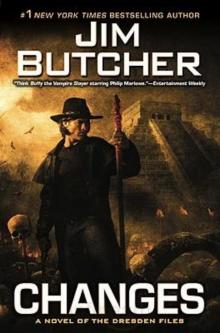 Changes
Changes White Night
White Night Death Masks
Death Masks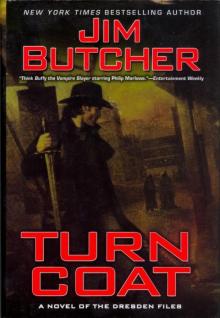 Turn Coat
Turn Coat Storm Front
Storm Front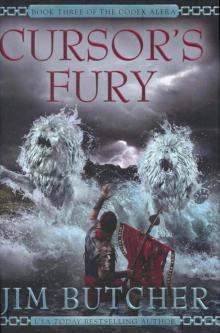 Cursor's Fury
Cursor's Fury Fool Moon
Fool Moon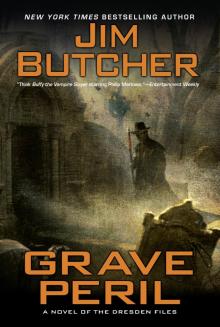 Grave Peril
Grave Peril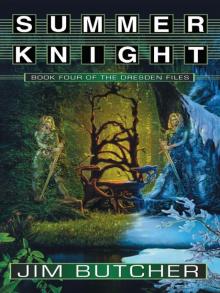 Summer Knight
Summer Knight Blood Rites
Blood Rites Ghost Story
Ghost Story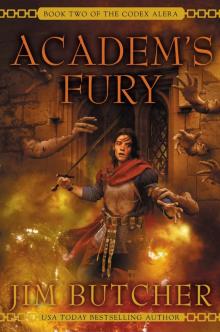 Academs Fury
Academs Fury Princeps' Fury
Princeps' Fury Captains Fury
Captains Fury Jim Butcher - Dresden Files Omnibus
Jim Butcher - Dresden Files Omnibus Christmas Eve
Christmas Eve Battle Ground
Battle Ground Blood Lite
Blood Lite Peace Talks
Peace Talks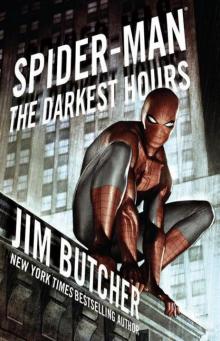 Spider-Man - The Darkest Hours
Spider-Man - The Darkest Hours Skin Game
Skin Game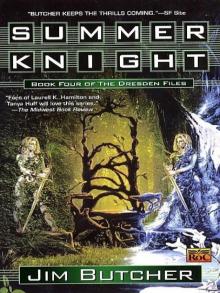 The Dresden Files 4: Summer Knight
The Dresden Files 4: Summer Knight First Lord's Fury ca-6
First Lord's Fury ca-6 Storm Front df-1
Storm Front df-1 Princeps Fury ca-5
Princeps Fury ca-5 Cold Days df-14
Cold Days df-14 Changes df-12
Changes df-12 Urban Enemies
Urban Enemies Princeps' Fury (Codex Alera)
Princeps' Fury (Codex Alera)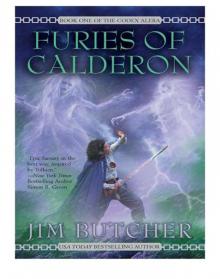 Codex Alera 01 - Furies of Calderon
Codex Alera 01 - Furies of Calderon Dresden Files 02 - Fool Moon
Dresden Files 02 - Fool Moon Cold Days: A Novel of the Dresden Files
Cold Days: A Novel of the Dresden Files Working for Bigfoot
Working for Bigfoot Side Jobs
Side Jobs Even Hand
Even Hand Brief Cases: The Dresden Files
Brief Cases: The Dresden Files Blood Rites: Book Six of the Dresden Files
Blood Rites: Book Six of the Dresden Files Fool Moon df-2
Fool Moon df-2 The Dresden Files Collection 7-12
The Dresden Files Collection 7-12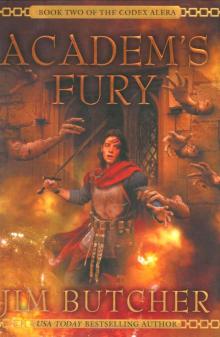 Academ's Fury ca-2
Academ's Fury ca-2 The Dresden Files 3: Grave Peril
The Dresden Files 3: Grave Peril Grave Peril df-3
Grave Peril df-3 Codex Alera 06 - First Lord's Fury
Codex Alera 06 - First Lord's Fury Brief Cases
Brief Cases Dresden Files Book 02: Fool Moon
Dresden Files Book 02: Fool Moon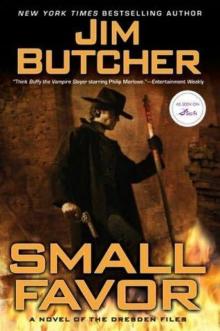 SMALL FAVOR tdf-10
SMALL FAVOR tdf-10 Bigfoot on Campus
Bigfoot on Campus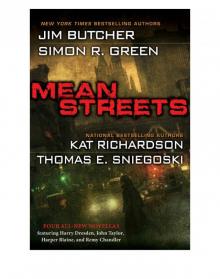 Mean Streets
Mean Streets Dead Beat df-7
Dead Beat df-7 White Night df-9
White Night df-9 Shadowed Souls
Shadowed Souls Dresden Files 14 - Cold Days
Dresden Files 14 - Cold Days The Dresden Files Collection 1-6
The Dresden Files Collection 1-6 Captain's Fury ca-4
Captain's Fury ca-4 Odd jobs sftdf-2
Odd jobs sftdf-2 The Dresden Files 1: Storm Front
The Dresden Files 1: Storm Front Blood Rites df-6
Blood Rites df-6 Side Jobs: Stories from the Dresden Files
Side Jobs: Stories from the Dresden Files B is for Bigfoot
B is for Bigfoot Proven Guilty df-8
Proven Guilty df-8 Dresden Files SSC01 - Side Jobs
Dresden Files SSC01 - Side Jobs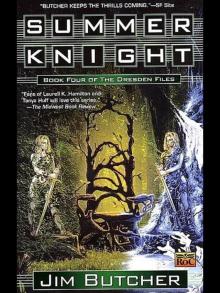 Summer Knight: Book Four of the Dresden Files
Summer Knight: Book Four of the Dresden Files Skin Game: A Novel of the Dresden Files
Skin Game: A Novel of the Dresden Files Cursors's Fury ca-3
Cursors's Fury ca-3 Dresden Files SSC02 - Odd Jobs
Dresden Files SSC02 - Odd Jobs Death Masks df-5
Death Masks df-5 Restoration of Faith (the dresden files)
Restoration of Faith (the dresden files) Furies of Calderon ca-1
Furies of Calderon ca-1 The Dresden Files 2: Fool Moon
The Dresden Files 2: Fool Moon Dresden files:Side jobs (dresden files:short stories)
Dresden files:Side jobs (dresden files:short stories) I Was a Teenage Bigfoot
I Was a Teenage Bigfoot Ghost Story df-13
Ghost Story df-13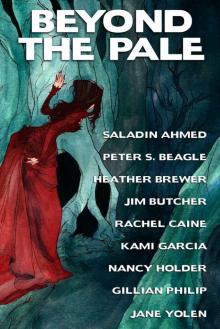 Beyond the Pale: A fantasy anthology
Beyond the Pale: A fantasy anthology Dresden Files 03 - Grave Peril
Dresden Files 03 - Grave Peril Side Jobs df-13
Side Jobs df-13